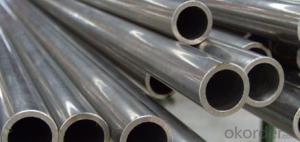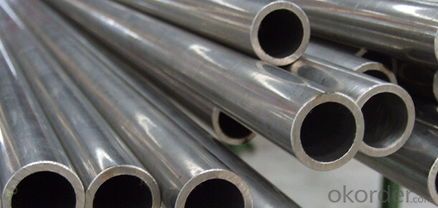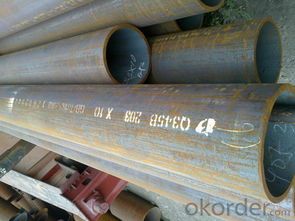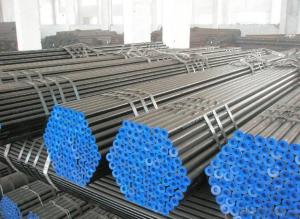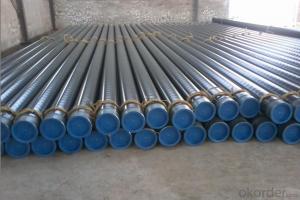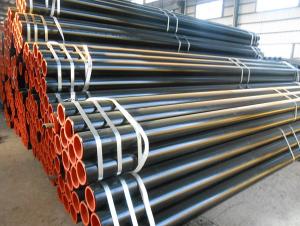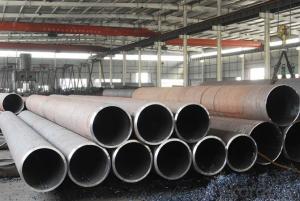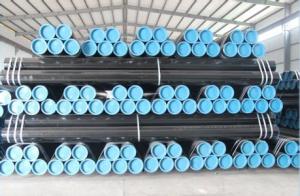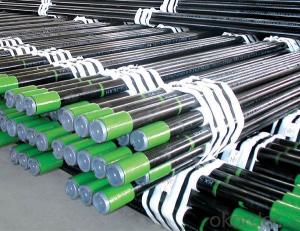API 5L/ 5CT Seamless Carbon Steel Line Pipe
- Loading Port:
- Tianjin
- Payment Terms:
- TT OR LC
- Min Order Qty:
- 25 m.t.
- Supply Capability:
- 10000 m.t./month
OKorder Service Pledge
OKorder Financial Service
You Might Also Like
Product Description:
1、Structure of API 5L/ 5CT Seamless Carbon Steel Line Pipe Description:
Seamless steel pipe is formed by drawing a solid billet over a piercing rod to create the hollow shell. As the manufacturing process does not include any welding, seamless pipes are perceived to be stronger and more reliable. Historically seamless pipe was regarded as withstanding pressure better than other types, and was often more easily available than welded pipe.
2、Main Features of API 5L/ 5CT Seamless Carbon Steel Line Pipe:
• High manufacturing accuracy
• High strength
• Small inertia resistance
• Strong heat dissipation ability
• Good visual effect
• Reasonable price
3、 API 5L/ 5CT Seamless Carbon Steel Line PipeImages:
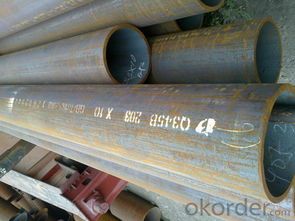
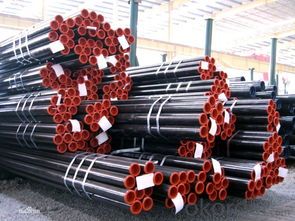
Packaging & Delivery
Packaging Details: | seaworthy package,bundles wrapped with strong steel strip |
Delivery Detail: | 15-30days after received 30%TT |
4、 API 5L/ 5CT Seamless Carbon Steel Line Pipe Specification:
Standard | GB, DIN, ASTM |
Grade | 10#-45#, 16Mn |
Thickness | 8 - 33 mm |
Section Shape | Round |
Outer Diameter | 133 - 219 mm |
Place of Origin | Shandong, China (Mainland) |
Secondary Or Not | Non-secondary |
Application | Hydraulic Pipe |
Technique | Cold Drawn |
Certification | API |
Surface Treatment | factory state or painted black |
Special Pipe | API Pipe |
Alloy Or Not | Non-alloy |
Length | 5-12M |
Outer Diameter | 21.3-610mm |
Grade | 20#, 45#, Q345, API J55, API K55, API L80, API N80, API P110, A53B |
Standard | ASME, ASTM |
1.Material:20#(ASTM A 106/A53 GRB.API5LGRB,GB),45#,16Mn,10#.
2.Specification range:OD:21.3-610mm,WT:6-70mm,length:6-12m or according to the requirement of clients.
3.Excutive standards:GB,ASME API5L.ASTM A 106/A53,Despite of the above standards,we can also supply seamless steel pipe with standard of DIN,JIS,and so on,and also develop new products according to the requirements of our clients!
4.Surface:black lacquered,varnish coating or galvanized.
5.Ends:Beveled or square cut,plastic capped,painted.
6.Packing:bundles wrapped with strong steel strip,seaworthy packing.
5、FAQ of API 5L/ 5CT Seamless Carbon Steel Line Pipe:
①How is the quality of your products?
Our products are manufactured strictly according to national and internaional standard, and we take a test
on every pipe before delivered out. If you want see our quality certifications and all kinds of testing report, please just ask us for it.
Guaranteed: If products’ quality don’t accord to discription as we give or the promise before you place order, we promise 100% refund.
②How about price?
Yes, we are factory and be able to give you lowest price below market one, and we have a policy that “ for saving time and absolutely honest business attitude, we quote as lowest as possible for any customer, and discount can be given according to quantity”,if you like bargain and factory price is not low enough as you think, just don’t waste your time.Please trust the quotation we would give you, it is professional one.
③Why should you chose us?
Chose happens because of quality, then price, We can give you both.Additionally, we can also offer professional products inquiry, products knowledge train(for agents), smooth goods delivery, exellent customer solution proposals.Our service formula: good quality+good price+good service=customer’s trust
SGS test is available, customer inspection before shipping is welcome, third party inspection is no problem.
Any question, pls feel free to contact us !
- Q: Can steel pipes be used for marine applications?
- Yes, steel pipes can be used for marine applications.
- Q: Are steel pipes suitable for semiconductor manufacturing plants?
- Yes, steel pipes are suitable for semiconductor manufacturing plants. Steel pipes offer several advantages such as high strength, durability, and resistance to corrosion, making them ideal for transporting various fluids and gases used in semiconductor manufacturing processes. Additionally, steel pipes can withstand high pressure and extreme temperatures, ensuring the safe and efficient operation of semiconductor manufacturing plants.
- Q: How do you connect steel pipes together?
- Various industries commonly employ several methods to connect steel pipes together. One frequently utilized technique is welding, which involves the heating of the steel pipe ends and their subsequent joining using a welding rod or wire. This method results in a robust and enduring connection that can withstand high pressures and temperatures. Threading, another method, entails cutting threads into the ends of the steel pipes. These threaded ends can then be screwed together using pipe fittings such as couplings or unions. Threading is particularly advantageous for smaller diameter pipes as it allows for easy disassembly and reassembly. Flanges also serve as a means to connect steel pipes. These flat, circular discs with holes can be bolted together, providing a secure connection. Flanges are especially suitable for large diameter pipes or those that require frequent disconnection for maintenance or repairs. Pipe fittings, such as couplings, tees, elbows, or reducers, can also be employed for connecting steel pipes. These fittings, typically composed of steel or other materials, are designed for welding, threading, or utilizing other connection methods like grooving or compression. It is important to consider various factors, such as pipe size, application, required strength, and adherence to industry standards or codes, when selecting the appropriate method for joining steel pipes. Consulting with a qualified professional or referring to industry-specific guidelines is essential in making this decision.
- Q: Can steel pipes be used for transporting drinking water?
- Yes, steel pipes can be used for transporting drinking water. However, it is important to ensure that the steel pipes are properly coated and protected to prevent any corrosion or leaching that could contaminate the water. Additionally, regular maintenance and monitoring of water quality should be conducted to ensure the safety of the drinking water.
- Q: What is the fatigue strength of steel pipes?
- The fatigue strength of steel pipes refers to their ability to withstand repeated cyclic loading without experiencing failure. It is a critical characteristic for pipes that are subject to dynamic or fluctuating loads, such as those used in the oil and gas industry, transportation infrastructure, or industrial applications. The fatigue strength of steel pipes can vary depending on several factors, including the steel grade, pipe dimensions, manufacturing process, surface conditions, and environmental factors. Steel pipes with higher tensile strength and toughness generally exhibit better fatigue resistance. The fatigue strength is typically determined through fatigue testing, which involves subjecting the pipes to cyclic loading until failure occurs. The results are then used to establish a fatigue curve or S-N curve, which represents the relationship between the applied stress amplitude and the number of cycles to failure. The fatigue strength is commonly expressed as the stress amplitude required to cause failure after a specific number of cycles, such as the stress amplitude at 10 million cycles (S-N10^7). It is important to note that fatigue strength is influenced by other factors, such as mean stress, surface finish, and loading frequency, which may need to be considered in specific applications. Overall, the fatigue strength of steel pipes is a crucial factor to consider in engineering design and maintenance, as it helps ensure the long-term integrity and reliability of the pipes under cyclic loading conditions.
- Q: How are steel pipes used in the water supply system?
- Steel pipes are commonly used in the water supply system due to their durability and strength. They are used to transport water from the source, such as a reservoir or water treatment plant, to various distribution points, such as homes, buildings, and industries. Steel pipes are resistant to corrosion and can handle high water pressure, making them ideal for long-distance water transportation. Additionally, steel pipes are often used in underground applications, as they can withstand the weight of soil and other external forces.
- Q: Are steel pipes suitable for transporting fluids?
- Yes, steel pipes are highly suitable for transporting fluids due to their durability, strength, and resistance to corrosion. They can safely and efficiently transport a wide range of fluids, including water, oil, gas, and chemicals, making them a popular choice in various industries such as oil and gas, water supply, and construction.
- Q: Seamless steel pipe 8162 and 8163 what is the difference?
- GB 8162 is the structure of the tube, there is no need for flaw detection, the use of mechanical processing, stents;
- Q: How are steel pipes used in the construction of railway tracks?
- Steel pipes are used in the construction of railway tracks as they provide a strong and durable foundation. They are typically used for the support and reinforcement of the tracks, helping to distribute the weight of the trains and ensuring stability. Steel pipes also play a crucial role in drainage systems, allowing for proper water flow and preventing damage to the tracks.
- Q: What are the different types of steel pipe coatings for chemical processing plants?
- There are several types of steel pipe coatings commonly used in chemical processing plants. These include fusion bonded epoxy (FBE) coatings, polyethylene (PE) coatings, polyurethane (PU) coatings, and solvent-based coatings. Each coating offers unique properties and advantages, such as corrosion resistance, chemical resistance, and abrasion resistance, to protect the steel pipes from the harsh environment and chemicals present in chemical processing plants.
Send your message to us
API 5L/ 5CT Seamless Carbon Steel Line Pipe
- Loading Port:
- Tianjin
- Payment Terms:
- TT OR LC
- Min Order Qty:
- 25 m.t.
- Supply Capability:
- 10000 m.t./month
OKorder Service Pledge
OKorder Financial Service
Similar products
Hot products
Hot Searches
Related keywords
